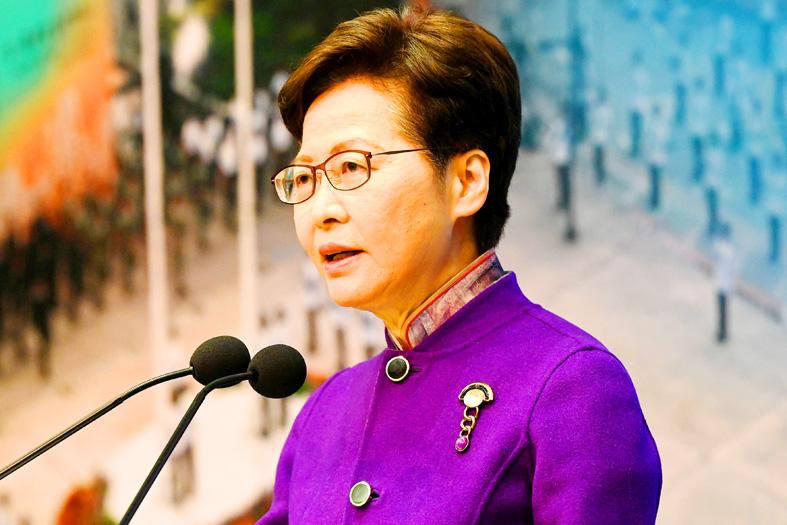Hong Kong Chief Executive Carrie Lam (林鄭月娥) yesterday hailed the outcome of a “patriots only” legislative election that saw a record-low voter turnout and government loyalists sweep every seat.
The territory selected new lawmakers on Sunday under fresh rules imposed by Beijing that dramatically cut directly elected seats and controlled who could stand for office after huge democracy protests convulsed Hong Kong two years ago.
Figures showed that just 30 percent of the electorate cast ballots, the lowest rate both of the period since the territory’s 1997 handover to China and the British colonial era.

Photo: AFP
Lam defended the new system and played down the poor turnout.
“Hong Kong is now back on the right track of one country, two systems,” she told reporters.
“We cannot copy and paste the so-called democratic system or rules of the Western countries,” she said, arguing that the new rules meant “anti-China” elements were now excluded and political calm restored.
When asked why only 1.3 million of the 4.5 million registered voters cast ballots, Lam replied: “What is the reason, I can’t analyze. You may need to turn to other opinion leaders.”
Chinese Ministry of Foreign Affairs spokesman Zhao Lijian (趙立堅) blamed the low turnout on the COVID-19 pandemic and “anti-China elements bent on destroying Hong Kong and the interference of external forces.”
Lam yesterday flew to Beijing to meet Chinese leaders as focus shifts to whether she will get backing for a second term in March when a 1,500-strong Election Committee stacked with Beijing loyalists is to pick the territory’s next leader.
With her public approval ratings at about 36 percent, Lam has so far declined to say whether she would seek a second term.
Hong Kong has never been a full democracy under either Britain or China, the source of years of protests. Beijing responded to months of huge rallies in 2019 by imposing a National Security Law criminalizing much dissent and political reforms to remove anyone deemed unpatriotic.
Most of the territory’s prominent democracy advocates — including many former elected lawmakers — are either in jail, have fled overseas or been disqualified. Alongside screening out “anti-China” elements, directly elected seats were slashed from half to 22 percent. The largest chunk — 40 — were picked by the Election Committee. The remaining 30 were chosen by larger pro-Beijing committees that represent special interest and industry groups.
Only 11 of the 153 candidates who made it through the vetting process were identified as “centrist” or “non-establishment” by local media, but none won enough votes.
The result is a Legislative Council stacked with government loyalists. Analysts said the new system could leave Hong Kong’s rulers even more out of touch with its residents.
“The tension between the authorities and the people will remain in place for a long time while the legislators won’t be mediators because they have to toe Beijing’s line,” Chung Kim-wah (鍾劍華) of the Hong Kong Public Opinion Research Institute said.

MAKING WAVES: China’s maritime militia could become a nontraditional threat in war, clogging up shipping lanes to prevent US or Japanese intervention, a report said About 1,900 Chinese ships flying flags of convenience and fishing vessels that participated in China’s military exercises around Taiwan last month and in January have been listed for monitoring, Coast Guard Administration (CGA) Deputy Director-General Hsieh Ching-chin (謝慶欽) said yesterday. Following amendments to the Commercial Port Act (商港法) and the Law of Ships (船舶法) last month, the CGA can designate possible berthing areas or deny ports of call for vessels suspected of loitering around areas where undersea cables can be accessed, Oceans Affairs Council Minister Kuan Bi-ling (管碧玲) said. The list of suspected ships, originally 300, had risen to about 1,900 as

Japan’s strategic alliance with the US would collapse if Tokyo were to turn away from a conflict in Taiwan, Japanese Prime Minister Sanae Takaichi said yesterday, but distanced herself from previous comments that suggested a possible military response in such an event. Takaichi expressed her latest views on a nationally broadcast TV program late on Monday, where an opposition party leader criticized her for igniting tensions with China with the earlier remarks. Ties between Japan and China have sunk to the worst level in years after Takaichi said in November that a hypothetical Chinese attack on Taiwan could bring about a Japanese

Right-wing political scientist Laura Fernandez on Sunday won Costa Rica’s presidential election by a landslide, after promising to crack down on rising violence linked to the cocaine trade. Fernandez’s nearest rival, economist Alvaro Ramos, conceded defeat as results showed the ruling party far exceeding the threshold of 40 percent needed to avoid a runoff. With 94 percent of polling stations counted, the political heir of outgoing Costa Rican President Rodrigo Chaves had captured 48.3 percent of the vote compared with Ramos’ 33.4 percent, the Supreme Electoral Tribunal said. As soon as the first results were announced, members of Fernandez’s Sovereign People’s Party

MORE RESPONSIBILITY: Draftees would be expected to fight alongside professional soldiers, likely requiring the transformation of some training brigades into combat units The armed forces are to start incorporating new conscripts into combined arms brigades this year to enhance combat readiness, the Executive Yuan’s latest policy report said. The new policy would affect Taiwanese men entering the military for their compulsory service, which was extended to one year under reforms by then-president Tsai Ing-wen (蔡英文) in 2022. The conscripts would be trained to operate machine guns, uncrewed aerial vehicles, anti-tank guided missile launchers and Stinger air defense systems, the report said, adding that the basic training would be lengthened to eight weeks. After basic training, conscripts would be sorted into infantry battalions that would take